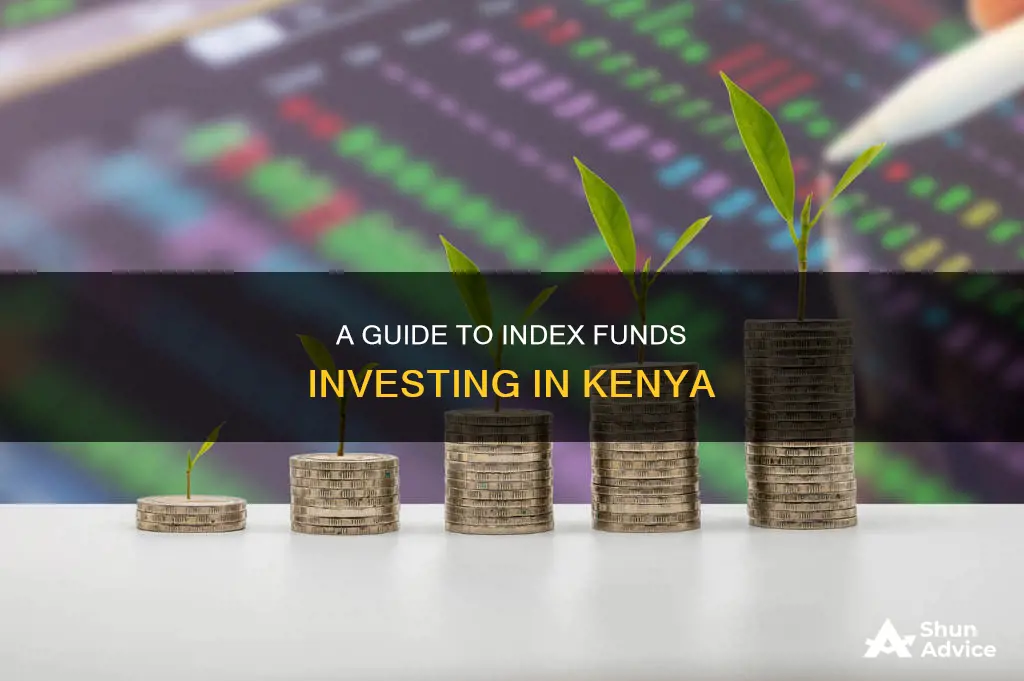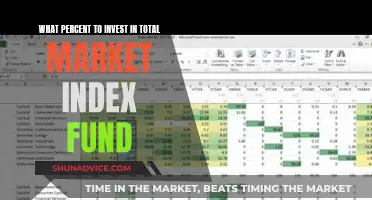
Index funds are a type of investment vehicle that allows individuals to invest in a collection of stocks or other assets, providing diversification and reducing risk. In Kenya, investors can access index funds through Exchange-Traded Funds (ETFs) or mutual funds. ETFs are traded on exchanges, such as the Nairobi Securities Exchange (NSE), and mirror the performance of specific indices like the NSE 20 or NSE 25. Mutual funds, on the other hand, are managed by investment professionals and can be accessed through platforms like Standard Chartered Kenya, which offers a range of international mutual funds. When investing in index funds, it is important to consider factors such as diversification, fees, and the underlying index being tracked.
| Characteristics | Values |
|---|---|
| Definition | A listed investment product that tracks the performance of a particular index or "basket" of shares, bonds, money market instruments or a single commodity |
| Types | Index, Bond, Commodity, Stock |
| Benefits | Diversification, Regulation, Cash flow distributions (dividends), Liquidity, Tax exemption, Hassle-free investment, Transparency, Flexibility |
| Parties involved | Market Maker, Manager, Trustee |
| Examples | NSE 20, NSE 25 |
What You'll Learn

Index funds vs. exchange-traded funds (ETFs)
Index funds and ETFs are both excellent investment vehicles for beginners and experts alike, offering low-cost ways to gain broad market exposure. While they share many similarities, there are some key differences to note.
Index funds are a broad category that includes passively managed mutual funds and ETFs. They track the performance of a specific market index, such as the S&P 500 for large US stocks or the Bloomberg US Aggregate Bond Index for bonds. The appeal of index funds lies in their simplicity, cost-effectiveness, and broad diversification. Index funds are priced once daily after the market closes, and investors buy or sell shares directly from the fund company.
On the other hand, ETFs are traded on stock exchanges like individual stocks, offering intraday trading flexibility. ETFs represent baskets of securities and can track various assets, including stocks, bonds, commodities, or currencies. They can be both actively and passively managed. ETFs have lower minimum investment requirements, and investors can often buy as few as one share. Additionally, ETFs are more tax-efficient than index funds due to their structure, which minimizes capital gains distributions.
When choosing between index funds and ETFs, consider your investment goals, time horizon, and trading preferences. Both options provide broad diversification and low costs, but ETFs offer more flexibility in terms of trading throughout the day and may have lower minimum investment requirements. However, index funds could be preferable for long-term investors who don't need the intraday trading capability of ETFs.
In Kenya, investors can invest in mutual funds through Standard Chartered Kenya, which offers access to over 100 international mutual funds. Additionally, the Nairobi Securities Exchange (NSE) provides a platform for trading Exchange-Traded Funds (ETFs), offering benefits such as diversification, regulation, liquidity, and tax advantages.
Index Funds: Best Time to Invest and Maximize Returns
You may want to see also

Advantages and disadvantages of investing in ETFs
Exchange-traded funds (ETFs) are gaining popularity in Kenya, offering a wide range of benefits to investors. Here are the advantages and disadvantages of investing in ETFs:
Advantages of Investing in ETFs:
- Diversification: ETFs provide investors with exposure to a diverse range of securities or assets, including stocks, bonds, and commodities. This diversification reduces the risk of investing in individual stocks or bonds.
- Regulation: In Kenya, ETFs are well-regulated by the Nairobi Securities Exchange (NSE) and the Capital Markets Authority (CMA), providing added protection for investors against unjust treatment.
- Cash flow distributions (dividends): Even though owning an ETF does not give direct ownership of the underlying securities, investors are still eligible to receive dividends if the securities in the tracked index pay them.
- Liquidity: ETFs can be bought and sold quickly and at a low cost, providing flexibility for investors to enter and exit investment positions easily.
- Tax advantages: In Kenya, ETFs are exempt from Capital Gains Tax upon the sale, offering further financial benefits to investors.
- Hassle-free investment: ETFs allow investors to gain exposure to a wide range of securities or assets without the need to buy individual constituents, conduct extensive research, or actively manage the underlying securities.
- Transparency: ETFs disclose their holdings daily, enabling investors to know exactly what stocks or underlying assets they hold and their value, facilitating more informed investment decisions.
- Flexibility: ETFs trade throughout market hours, providing investors with the flexibility to react to market changes.
Disadvantages of Investing in ETFs:
- Less diversification: In certain sectors or foreign stocks, ETF investors might only have access to large-cap stocks due to a limited selection of equities in the market index. This lack of exposure to mid- and small-cap companies could result in missed growth opportunities for some investors.
- Intraday pricing impact: Longer-term investors might be induced to trade unnecessarily due to intraday price movements, potentially leading to emotional trading decisions that deviate from their investment objectives.
- Higher costs: While ETFs typically have lower expense ratios than actively managed funds, they are not immune to trading costs. Each time an ETF is bought or sold, investors usually pay a brokerage commission, which can accumulate with frequent trading.
- Lower dividend yields: While there are dividend-paying ETFs, the yields may not be as high as those obtained by owning high-yielding stocks or groups of stocks. Investors who can take on more risk might find higher dividend yields by investing directly in individual stocks.
- Skewed leveraged ETF returns: Leveraged ETFs use financial derivatives and debt to amplify the returns of an underlying index. However, these speculative investments can result in losses greater than the value change of the tracked index, especially when held for longer periods.
Vision Fund's WeWork Investment: A Bold, Early Move
You may want to see also

How to buy index funds
Index funds are a type of mutual fund that holds stocks of all the companies of a certain index and seeks to match the performance of that index. In Kenya, you can buy index funds through a brokerage or directly from a fund provider. Here is a step-by-step guide on how to buy index funds:
- Choose an index: Decide on the specific market index you want to track, such as the S&P 500, Dow Jones Industrial Average, or Nasdaq Composite. You can also choose sector indexes tied to specific industries, country indexes, or style indexes.
- Select the right fund: Once you've chosen an index, look for an index fund that closely tracks its performance. Compare the fees and costs associated with different funds, as well as any limitations or restrictions on investing. Also, consider whether the fund provider has other index funds that align with your investment goals.
- Open an account: You can open a brokerage account that allows you to buy and sell shares of the index fund. Alternatively, you can open an account directly with a mutual fund company that offers the index fund you're interested in. Consider the costs and features of each option before deciding.
- Buy index fund shares: After setting up your account, you can purchase shares of the index fund. Index funds can come in exchange-traded fund (ETF) or mutual fund forms. ETFs can be traded at any time during the day, while index funds can only be traded at the price set at the end of the day.
- Monitor and diversify your investments: Regularly review the performance of your index fund investments. Consider diversifying your portfolio by investing in multiple index funds across different sectors and industries to minimise risk.
By following these steps, you can start investing in index funds in Kenya, allowing you to build a diversified portfolio that tracks the performance of specific market indexes. Remember to consider your investment goals, risk tolerance, and conduct thorough research before making any investment decisions.
Smartly Investing 5 Lacs in Mutual Funds
You may want to see also

Mutual funds in Kenya
Mutual funds are a type of investment vehicle that allows investors to pool their money together and have it managed by a team of investment professionals. This is done in line with a predefined mandate or investment strategy. In Kenya, one can invest in mutual funds through the Standard Chartered Kenya (SC) Mobile App. The app offers access to over 100 international mutual funds managed by reputed fund managers.
Benefits of Mutual Funds
Mutual funds offer instant diversification, allowing investors to spread their investment risk across many securities. This potentially reduces the volatility of an investment portfolio. With mutual funds, investors can gain exposure to equity and bond markets around the world, with investment amounts ranging from USD 1,000 through lump sum payments or USD 100 through a wealth builder.
Risks of Mutual Funds
As with any investment, there is a risk of losing money. The value of investments and dividends can go up or down, and in extreme cases, be completely lost. Foreign exchange risk is another factor to consider, as is the potential for higher volatility in funds that invest in derivatives.
Types of Mutual Funds
Mutual funds can be categorised by their underlying asset class, with the main types being equity, bond, and balanced funds.
Process of Investing in Mutual Funds in Kenya
To invest in mutual funds in Kenya, one must be an SCB Kenya account holder. After this, a relationship manager will profile the client and show them a list of offshore mutual funds that match their risk profile. Alternatively, one can use the SC Mobile App to complete an investment risk profile and view fund options aligned with their risk rating.
Transactions in Mutual Funds
Through the SC Mobile App, investors can carry out transactions 24/7, allowing them to buy, sell, or track their mutual fund portfolio at any time. Subscription (buy) and redemption (sell) orders can be placed through the Online Mutual Funds Platform.
Vanguard Funds: Ethical Investing and Weapons Manufacturers
You may want to see also

Index fund investment risks
Index funds are a popular investment vehicle, providing an easy way to gain exposure to a wide range of securities or assets. They are a type of mutual fund that holds stocks of all the companies within a certain index, aiming to match the performance of that index. While index funds offer several benefits, there are also some risks and limitations to be aware of before investing. Here are some of the key risks associated with investing in index funds in Kenya:
- Limited gains and average returns: When investing in an index fund, you will receive the average return of all the companies that make up the index. This means that the strong performance of some companies may be offset by the weaker returns of others, leading to potentially lower gains compared to investing in individual stocks.
- Exposure to large-cap stocks: Index funds that replicate the performance of large-cap stocks only may cause investors to miss out on the higher returns associated with small-cap stocks, which have greater growth potential.
- Volatility: Index funds are subject to market volatility, especially during economic downturns or stock market declines. When the index an index fund is tracking experiences a plunge, the fund will also plunge, exposing investors to potential losses.
- Lack of outperformance: Index funds are designed to match the performance of a specific index or market benchmark. As a result, they do not offer the potential to outperform the market or beat a certain benchmark, unlike actively managed funds.
- Regulatory and protection concerns: According to a study on the framework for index funds in Kenya, there are concerns about the inefficiency of capital markets and a lack of adequate regulation and investor protection. These issues need to be addressed to ensure the successful introduction and management of index funds in the country.
- Foreign exchange risk: If an index fund invests in assets denominated in foreign currencies, it may be subject to foreign exchange risk, which can negatively impact the fund's performance and, consequently, the returns for investors.
- Investment risk: As with any investment, there is a risk of losing money when investing in index funds. The value of the investment and any dividends may decrease or be lost entirely in extreme cases.
Mutual Funds in India: Steps to Invest Directly
You may want to see also
Frequently asked questions
An index fund is an investment that tracks a market index, such as the S&P 500 or Nasdaq Composite. Index funds can be used to invest in specific sectors or types of stocks and fixed-income investments like bonds.
You can invest in index funds indirectly through an index fund or an exchange-traded fund (ETF) that mirrors the performance of the index. Exchange-traded funds (ETFs) trade like stocks on the stock exchange and mirror their respective indices.
Investing in stocks through index funds is a lower-risk investment compared to buying individual stocks. Indexing is called passive investing because it does not require extensive analysis and market corrections. Index funds are also associated with minimal investment research, managed investment risk, low fees, and tax efficiency.







